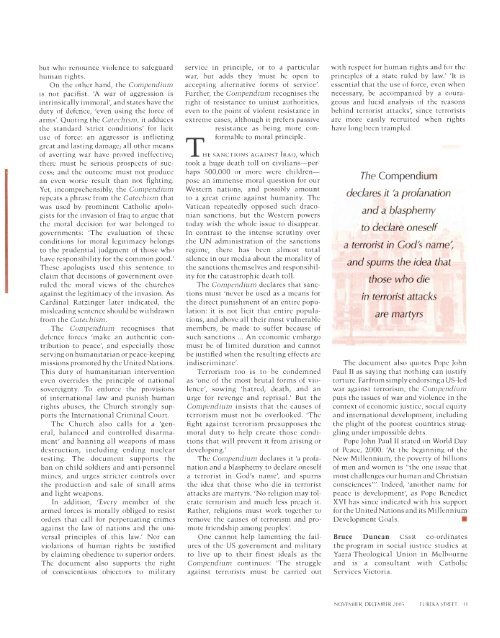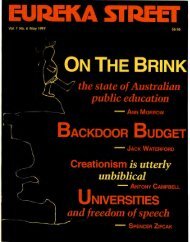0 - Eureka Street
0 - Eureka Street
0 - Eureka Street
You also want an ePaper? Increase the reach of your titles
YUMPU automatically turns print PDFs into web optimized ePapers that Google loves.
u t who renounce violence to safeguard<br />
human rights.<br />
On the other hand, the Compendium<br />
is not pacifist . 'A war of aggression is<br />
intrinsically immoral', and states have the<br />
duty of defence, 'even using the force of<br />
arms'. Quoting the Catechism, it adduces<br />
the standard 'strict conditions' for licit<br />
u se of force: an aggressor is inflicting<br />
great and lasting damage; all other means<br />
of averting war have proved ineffective;<br />
there must be serious prospects of success;<br />
and the outcome must not produce<br />
an even worse result than not fighting.<br />
Yet, incomprehensibly, the Compendi um<br />
repeats a phrase from the Catechism that<br />
was used by prominent Catholic apologists<br />
for the invasion of Iraq to argue that<br />
the moral decision for war belonged to<br />
governments: 'The evaluation of these<br />
conditions for moral legitimacy belongs<br />
to the prudential judgment of those who<br />
have responsibility for the common good.'<br />
These apologists used this sentence to<br />
claim that decisions of government overruled<br />
the moral views of the churches<br />
against the legitimacy of the invasion. As<br />
Cardinal Ratzinger later indicated, the<br />
misleading sentence should be withdrawn<br />
from the Cat echism .<br />
The Compendi um recognises that<br />
defence forces 'make an authentic contribution<br />
to peace', and especially those<br />
serving on humanitarian or peace-keeping<br />
m issions promoted by the United Nations.<br />
This duty of humanitarian intervention<br />
even overrides the principle of national<br />
sovereignty. To enforce the provisions<br />
of international law and punish human<br />
rights abuses, the Church strongly supports<br />
the International Criminal Court.<br />
The Church also calls for a 'general,<br />
balanced and controlled disarmament'<br />
and banning all weapons of mass<br />
destruction, including ending nuclear<br />
testing. The document supports the<br />
ban on child soldiers and anti-personnel<br />
mines, and urges st ricter controls over<br />
the production and sale of sm all arms<br />
and light w eapons.<br />
In addition, 'Every member of the<br />
armed forces is morally obliged to resist<br />
orders that call for perpetuating crimes<br />
against the law of nations and the universal<br />
principles of this law.' Nor can<br />
violations of human rights be justified<br />
by claiming obedience to superior orders.<br />
The document also supports the right<br />
of conscientiou s objectors to military<br />
service in principle, or to a particular<br />
war, but adds they 'must be open to<br />
accepting alternative form s of service'.<br />
Further, the Compendium recognises the<br />
right of resistance to unjust authorities,<br />
even to the point of violent resistance in<br />
extreme cases, although it prefers passive<br />
resistance as being more conformable<br />
to moral principle.<br />
T HE SANCTIONS AGAINST IRAQ, which<br />
took a huge death toll on civilians-perhaps<br />
500,000 or n1.ore were childrenpose<br />
an immense moral question for ou r<br />
Western nations, and possibly amount<br />
to a great crime against humanity. The<br />
Vatican repeatedly opposed such draconian<br />
sanctions, but the Western powers<br />
today wish the whole issue to disappear.<br />
In contrast to the intense scrutiny over<br />
the UN administration of the sanctions<br />
regime, there has been almost total<br />
silence in our media about the morality of<br />
the sanctions themselves and responsibility<br />
for the catastrophic death toll.<br />
The Compendium declares that sanctions<br />
must 'never be used as a means for<br />
the direct punishment of an entire population:<br />
it is not licit that entire populations,<br />
and above all their most vulnerable<br />
members, be m ade to suffer because of<br />
such sanctions ... An economic embargo<br />
must be of limited duration and ca nnot<br />
be justified when the resulting effects are<br />
indiscriminate'.<br />
Terrorism too is to be condemned<br />
as 'one of the m ost brutal forms of violence',<br />
sowing 'hatred, death, and an<br />
urge fo r revenge and reprisal.' But the<br />
Com pendi um insists that the causes of<br />
terrorism must not be overlooked. 'The<br />
fight against terrorism presupposes the<br />
moral duty to help create those condition<br />
s that will prevent it from arising or<br />
developing.'<br />
The Compendium declares it 'a profanation<br />
and a blasphemy to declare oneself<br />
a terrorist in God's name', and spurns<br />
the idea that those who die in terrorist<br />
attacks are m artyrs. 'No religion m ay tolerate<br />
terrorism and much less preach it.<br />
Rather, religions must work together to<br />
remove the causes of terrorism and promote<br />
fr iendship among peoples'.<br />
One cannot help lamenting the fa ilures<br />
of the US government and military<br />
to live up to their fi nest ideals as the<br />
Compendium continues: 'The struggle<br />
aga inst terrorists must be carried out<br />
w it h respect for human rights and for the<br />
principles of a state ruled by law.' 'It is<br />
essential that the use of force, even when<br />
necessary, be accompanied by a courageous<br />
and lucid analysis of the reasons<br />
behind terrorist attacks', since terrorists<br />
are more easily recruited when rights<br />
have long been t ra mpled.<br />
The Compendium<br />
declares it 'a profanation<br />
and a blasphemy<br />
to declare oneself<br />
a terrorist in Cod's nam e~<br />
and spurns the idea that<br />
those who die<br />
in terrorist attacks<br />
are martyrs<br />
The document also quotes Pope John<br />
Paul II as saying that nothing can justify<br />
torture. Far from simply endorsing a US-led<br />
war against terrorism, the Compendium<br />
puts the issues of war and violence in the<br />
context of economic justice, social equity<br />
and international development, including<br />
the plight of the poorest countries struggling<br />
u nder impossible debts.<br />
Pope John Paul II stated on World Day<br />
of Peace, 2000: 'At the beginning of the<br />
New Millennium, the poverty of billions<br />
of m en and women is "the one issue that<br />
most challenges ou r human and Christian<br />
consciences'". Indeed, 'another name for<br />
peace is development', as Pope Benedict<br />
XVI has since indicated with his support<br />
for the United Nations and its Millennium<br />
D evelopment Goals.<br />
•<br />
Bruce Duncan CSsR co-ordi nates<br />
the program in social justice studies at<br />
Yarra T heological Union in Melbourne<br />
and is a consultant with Catholic<br />
Services Victoria.<br />
NOVEMBER- DECEMBER 2005 EU REKA STREET 31
















